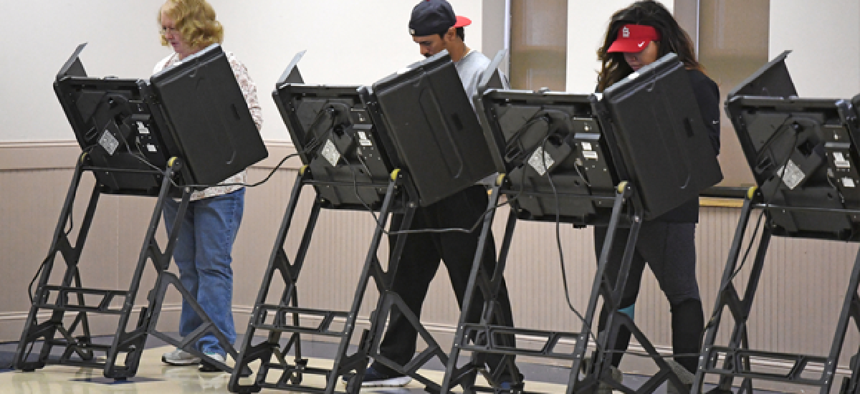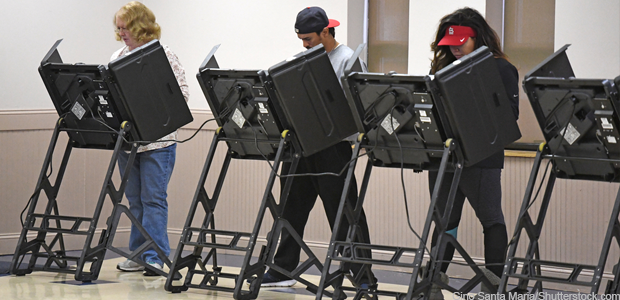On Election Day, DHS isn't seeing coordinated efforts to hack the vote

The Department of Homeland Security is monitoring voting nationwide from an operations center that includes representatives from states, political parties and federal law enforcement.

The Department of Homeland Security so far has "nothing significant to report" regarding coordinated activities meant to attack voting infrastructure on Election Day. DHS also observes far less activity around online election influence campaigns than in the lead up to the 2016 vote.
As of noon, the official said the greatest disruption to voting and voting machines has been machine operability issues related to weather, as much of the East Coast has been pummeled with rain. Tennessee suffered a power outage, but thus far it does not appear to have significantly impacted voting.
Multiple states have reported malfunctions or other technical issues that have taken voting machines or other election systems offline. In Georgia, a state that has been subject to criticism for not doing enough to protect and update voting infrastructure, multiple precincts have encountered technical problems that have led to delays or long lines. Lawrence Norden, deputy director for the Brennan Center for Justice, said on Twitter that outdated equipment is likely to blame in most instances.
"Many states with the most reports of machine problems are those with the oldest systems," said Norden. In particular, he pointed to states that rely on in whole or in part on Direct Recording Electronic machines like Texas, South Carolina, Pennsylvania, Georgia and New Jersey.
Reports have also come in of text messages and social media posts being sent to voters with incorrect information about voting dates and other matters. According to DHS, some of these are unintentional, the result of automated get out the vote systems that were sent too late. Others have been sent to social media companies or law enforcement for follow up.
"Every election there are those out there that try to send information to mislead or otherwise confuse voters," said a DHS official. "Those have been rapidly addressed by the platforms…and no tieback to foreign actors that we've seen."
DHS has hundreds of officials spread out across all 50 states, tailing chief election officers or stationed in state and local fusion centers. In Virginia, the department has set up three different rooms to coordinate security activities in the face of breaking developments. A situational awareness room that's designed for states to plug in and share information had 20 states logged on as of this morning, and DHS expects the number to rise and fall throughout the day.
"Nothing significant to report at this point, but consistent with our prior intelligence and information-sharing reports we have not seen to date any sort of coordinated campaign, certainly along the lines of 2016 -- but we are preparing as if there will be an event today," a DHS official told reporters on background.
Those comments are largely in line with a joint statement put out last night by DHS, the Department of Justice, the intelligence community and the FBI saying that there was "no indication of compromise of our nation's election infrastructure that would prevent voting, change vote counts or disrupt the ability to tally votes." DHS continues to see scanning of IT critical infrastructure, but the level of activity is "run of the mill stuff you see every day."
An unclassified operations center will house representatives from the National Association of Secretaries of State, the National Association of State Election Directors, the Democratic and Republican National Committees, the Information Technology Information Sharing and Analysis Center and interagency partners dedicated to election security efforts, such as the FBI. A separate operations center has also been set up for classified operations.
"What these three capabilities give us is the ability to share information, spot trends if they pop up and enable network defenders to address any problem," a DHS official said.
The official said the department continues "to see foreign adversaries, in particular Russia, conduct information and influence operations," but in line with previous statements, these operations are more general in nature, not necessarily tied to the midterm elections. The FBI had nothing to add to the joint statement.
An official from the National Association of State Election Directors told FCW that while the organization has seen and heard of instances of misinformation about voting online, it has yet to see anything that would indicate a coordinated effort at scale or a strategy of targeting certain states over others.
"It feels like this is an issue hitting everywhere roughly equally, with states you might expect and states you might not expect," said the official.
The prognosis comes after Facebook announced late last night that it had removed another 30 accounts on Facebook and 85 accounts on Instagram that "may be engaged in coordinated inauthentic behavior." The Facebook accounts were largely in French or Russian, while the Instagram accounts were mostly in English, according to Nathaniel Gleicher, head of cybersecurity policy for the social network.
Gleicher said the content of the accounts focused on different topics, from celebrities to political debates, and the company is still gathering additional information around who may have been running them.
FCW will be updating throughout the day with reports from the DHS election security headquarters.
This article was updated at 4 p.m. Nov. 6 with additional information.
NEXT STORY: Quick Hits for Nov. 6


